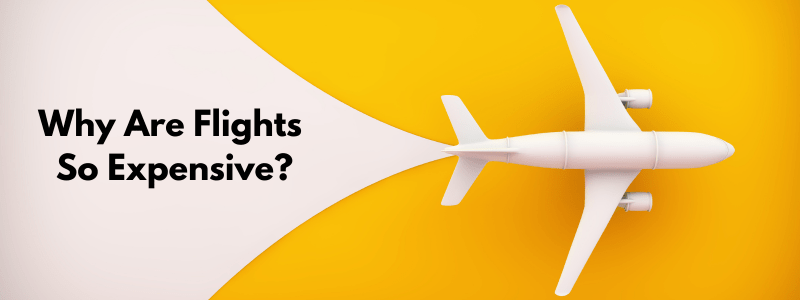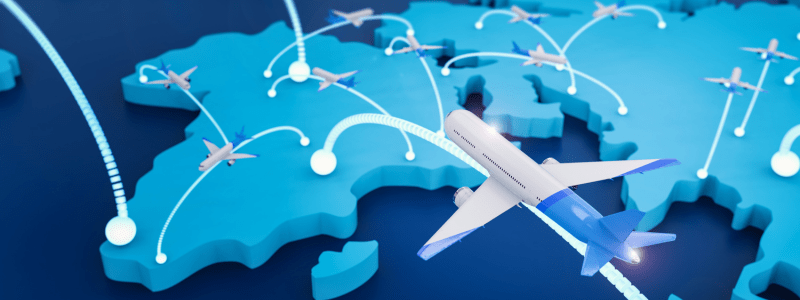
Flying is always some pretty incredible way of connecting the remotest parts of the world, but do you ever wonder why a simple plane ticket sometimes costs as much as one month’s rent? Let’s dive deep into the surprising truth behind why are flights so expensive and unravel every layer of this complex puzzle.
Understanding the Basics of Airfare Pricing
What Factors Influence Airfare?
Airfare pricing isn’t a straightforward or fixed process. Two things are going on. The price of fuel and the law of supply and demand. During high-demand periods, such as holidays, airlines raise fares to capitalize on the surge in bookings. Conversely, undesirable routes or off-seasons might offer lower fares.
How Airlines Calculate Ticket Prices
Airlines use sophisticated yield management systems, which are all about dynamic pricing, and rely on data analytics. These systems consider booking trends, seasonality, and, in some cases, competitor prices while pricing. Have you ever wondered why flight prices soar during Christmas? Airlines predict higher demand and raise prices accordingly.
The Role of Fuel Costs
Why Jet Fuel Prices Fluctuate
One of the largest operating costs for airlines is jet fuel. Its price is sensitive to global oil market trends as well as geopolitical considerations. As an example, a sudden conflict in an oil-producing region can shoot fuel prices upwards for the airlines, which then forwards the costs to consumers.
Environmental Regulations and Their Costs
Climate change measures make governments enforce rigid environmental policies such as carbon offset programs. Some of these are significantly important for sustainable development, but they cost more on operations translating more to the ticket price. Airlines use sustainable aviation fuel, which is more expensive but better for the environment.
Operational Expenses and Their Impact
The Cost of Running an Airline
Running an airline is expensive. Salaries for captains, plus the cost of training for the crew, are two good examples. When such costs easily add up, the major overheads, like marketing and technology, as well as all the customer service systems, can be enormous.
Airport Fees and Taxes
With each landing of an airplane, an airline has to pay the airport for landing. Besides, governments add several security fees and airport improvement charges to tickets. These additional costs inflate your ticket’s final price up to a huge amount of money.
Market Dynamics and Competition
The Impact of Low-Cost Carriers
Budget airlines like Ryanair and Southwest have disrupted the market by offering lower fares. However, these carriers often compensate with hidden fees for baggage, seat selection, and even printing your boarding pass. While they make air travel accessible, they also highlight the limitations of price wars in reducing overall airfare.
Monopoly Routes and Price Control
On less traveled routes, especially those that serve less accessible or less developed destinations, competition is minimal. While airlines will take advantage of this and set higher prices, travelers have very few options.
Post-Pandemic Challenges
How COVID-19 Reshaped Air Travel
Airline capacity was reduced, and high costs in safety protocols mounted when the pandemic struck. Even though demand has bounced back, the lesser number of flights creates a supply bottleneck that causes prices to increase.
Supply Chain Issues in Aviation
Aircraft production delays and labor shortages have made things much worse. The airlines that have fewer aircraft available are unable to meet the increasing demand, thus driving up ticket prices even further.
Hidden Costs Behind Every Ticket
Breaking Down Your Ticket Price
When purchasing a flight ticket, you’re not just paying for your seat on the plane. The total of what you pay to the airline is fundamentally broken down into a few components. There is that base fare that pays for the cost of making the flight take place, but that isn’t all-there are also surcharges, taxes, and add-on fees. Fuel surcharges are usually included, while baggage and seat selection fees are often added separately.
Why Flexibility Costs More
Wonder why flexible tickets cost so much money? It is simple: they offer flexibility without penalty. In other words, no penalty charges for changing or canceling flights for a refundable ticket, extra legroom, or priority boarding on premium services cost money and reflect their worth to time-conscious travelers.
The Role of Advanced Technology
How AI Impacts Ticket Prices
Artificial intelligence is revolutionizing airfare pricing. Airlines use AI to analyze booking trends, predict demand, and adjust prices in real time. This technology allows them to maximize revenue by charging more during peak times and less during low-demand periods. It’s why prices can change within minutes of your last search.
Online Booking Platforms and Their Fees
While online platforms make it easier to book flights, it’s also chock-full of hidden fees. Some websites add a service fee or factor in overcharges above the airline, but metasearch engines like Google Flights or Skyscanner may represent more than one website but may also earn commissions influencing how those flights are represented.
Government Regulations and Their Effect
International Taxes and Duties
Flying across borders means more than just takeoff and landing to an airline. To do so, they have to navigate a cross-border web of international taxes and duties which comprehend departure taxes, air passenger duties, and other cross-border fees. Costs for such vary by country and are usually added directly to your ticket price.
Security Measures and Their Costs
After 9/11, global aviation security standards became stricter. Implementing these measures—such as advanced screening technologies and baggage checks—adds another layer of expense. Airports pass these costs to airlines, which, in turn, pass them to passengers.
Consumer Behavior and Demand Trends
How Timing Affects Prices
Timing is crucial when booking a flight. Those who book many months prior will, in general, find the lowest price; of course, last-minute tickets tend to get correlated with price gouging that comes with scarcity. These are also the peak demand periods, especially during holidays and summer breaks.
The Psychology of Pricing
Airlines are masters at using psychological pricing. Ever noticed how a $499 flight feels cheaper than a $500 one? Or how you’re pressured to book quickly with phrases like “Only 2 seats left”? These tactics take advantage of consumer behavior to boost profits.
Strategies to Save on Airfare

When to Book for the Best Deals
Timing your purchase is essential. While studies indicate that buying 1-3 months in advance for a domestic trip and 2-6 months for an international trip usually yields the cheapest fares, flying in the middle of the week, off-peak seasons, and odd hours can work out to be good deals for you.
Tips for Flying Affordably
- Use Points and Rewards: If you travel a lot, loyalty programs may save you hundreds of dollars.
- Be Flexible: Accepting yielding on dates of travel or airports of arrival often reduces travel costs.
- Compare Prices: Use meta-search engines, then check the airline’s website for the best price.
The Future of Flight Pricing
The Impact of Sustainable Aviation
As the world shifts toward green energy, so are the aviation industries. However, these sustainable aviation fuel (SAF) and carbon-neutral technologies are expensive, and promising but pricey. They may therefore start by being more expensive for customers but potentially begin to save over time.
Innovations That May Lower Costs
Electric and hybrid aircraft are being developed with promises to hugely reduce fuel costs. The technology of autonomous flight may also help cut labor expenses. While this innovation will take years, it promises a future of more affordable and sustainable air travel.
Conclusion
Flying may be costly, but understanding the reasons behind high ticket prices reveals the complexity of the airline industry. While there are many cost factors in flying- from fluctuating fuel prices and large operational costs to market dynamics and technological advancements-there is a way to cut down with strategic planning and innovations emerging for travelers to look forward to having air travel around the world for everyone.
To learn more about managing your finances effectively and ensuring financial success, check out our article Why Is Effective Money Management Important?
